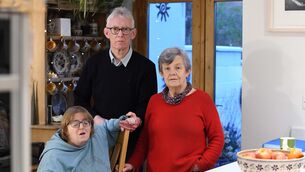Greece still feeling pain from bailout

THE agriculture minister resigned when the law banning the sale of milk more than five days old was changed. He said it would destroy Greece’s legendary quality milk.
Antonis Samaras, the prime minister, cut him loose. His parliament majority is down to two, but he got the Omnibus law passed hours before the EU’s finance ministers arrived for their meeting as part of the Greek EU presidency.
It was the essential final piece to ensure they agreed to release €8.3 billion from their second bailout. Eurogroup president Jeroen Dijsselbloem said he was pleased the fourth troika review of the Greek economy could be drawn to a close and described it as an “arduous process but a positive outcome”.
Outside hundreds of protestors vented their frustration at the ministers and the troika that is trying hard to change utterly their country and its administration. Greece has endured six years of recession and for ordinary people there is little sign of change.
The IMF — part of the troika — admits that there are “wide ranging social consequences”.
Wages are down at least 20%, The minimum wage is €586 a month and less for the under 25s; unemployment payments are 360 a month, and are cut off along with health cover after a year.
The Caritas report, edited by Ireland’s Fr Sean Healy, said all the changes in labour law have led to greater work insecurity, more part-time jobs or rolling working agreements. Half of the youth have no work and unemployment is around 24% despite massive emigration.
Kostas, one of the many staging massive protests to coincide with the finance ministers meeting, explained he has two degrees, speaks five languages and is learning his sixth, Russian, but works in a restaurant for €370 a month. “There are no jobs. There is no work. This isn’t a life,”, he says between chanting “troika out”.
Only 20% said they are optimistic about the future — the lowest in Europe. Their birth rate is down by 10%, still-births have increased by 21%, suicides are up and homelessness has increased by 25%. Real social spending is down by 17%.
And it will get worse many believe with the tottering health service on the verge of a total collapse and house repossessions the next step for banks battling to get back to business. Housing is a red line for Greeks where parents see it as their job to provide homes for their children.
Private debt is among the lowest in the EU because they so seldom have to take out mortgages — but during the boom many did and supplemented it with loans from family. Now many fear they will lose their homes. “There will be a revolution. To the Greeks their home is sacred”, said one man who works in a bank.
The OECD was equally gloomy in their study, commenting that the politicians and administration were not handling many of the problems very effectively. The firing of public sector employees, the shortage of money has made the bureaucracy even worse with reports of people waiting months and even years for disability payments.
The Paris-based think-tank funded by the world’s developed countries recommended 329 changes to the way Greece is governed — mostly to remove what they described as poorly designed regulation or disproportionate intervention by the state.
A host of them were bundled together in the Omnibus Bill of changes estimated to be worth €5.2bn a year to the economy.
Rules that mean there must be a minimum distance between hotels, sports centres, conference centres and pharmacies are being abolished. They were designed to protect their owners from competition — an alien concept in today’s world.
Pharmacies can open branches and be open six days a week, while over the counter medication can be sold elsewhere. The price of books will no longer be fixed and shops in three tourist areas will be allowed open on Sundays. The ban on outlets and discount stores also goes while bread and pastries must be weighed before sale.
Other issues being tackled are pensions. The size of their public sector workforce has not been overly big, but the jobs were handed out like gifts and protected for life with pensions up to 90% of final salary.
The country’s health system is being reorganised to try to rid it of the ‘brown envelope’ patients handed doctors while they paid more than any other in Europe for medical devices like hip implants.
The banks are being recapitalised, the government has managed to balance its budget and must now start tackling its massive debt of 160% % of GDP.
Now the government has announced it is returning to the markets — the cost of its debt has dropped like a stone, the speculators seem no longer interested in trying to push the country out of the eurozone. They government expects to post a primary budget surplus and hopes this will encourage its EU/IMF lenders to lighten their debt burden. They are even talking about a “clean exit” from the programme next year.
Along with Ireland Greece is top of the class, being described as the “reform champions” by Klaus Regling, managing director of the ESM, the EU’s rescue fund. They have the biggest increase in exports, cut in fiscal deficit, drop in unit labour costs and progress in structural reforms.
Germany is at the other end of the class, scoring 16 compared to Greece’s 1 and Ireland’s 2. The strategy is delivering vastly improved competitiveness and fiscal balance with Greece close to matching Germany, according to the European Commission’s figures.
None of these indicators take account of the human cost, however. Jorg Asmussen, who recently left the ECB to join the new German government, said the approach was right as proved by Ireland and Spain. Cutting education and health spending was “tough” but the alternative was bankruptcy, he maintained.
The economists contend that once the figures are right, then growth will return and the rising tide will lift all boats. But the details from Ireland suggest that competitiveness is being built on the backs of a workforce working for less, in jobs that are part time and often temporary. Tax and social welfare cuts means there is less to fund health, education and infrastructure.
But Greece also has another problem — itself. The Athens taxi driver pointed to the imposing building as he sped by said, “That’s the parliament. They are all mafia, all 300”. When he pulled up outside the hotel he asked for €13 — the fare is normally €5 — and the meter was not running. Caught out he laughed and said to give him whatever was fair.
“Success breeds complacency,” warns the Euro Plus Monitor report. And with the troika due to leave next year there are fears that the reforms may stall leaving a deeply indebted country just as corrupt and inefficient.
The new parliamentary ethics and transparency committee has ben given a list of 70 mayors and other high ranking local authority officials, doctors and journalists among others who have submitted wrong information on the source of their wealth put together by the anti money laundering body.
This is the kind of thing that will test the resolve of the “new Greece”.













